As the business world continues to change, it is becoming more important for companies to evolve and adapt to new trends.
In order to stay relevant and competitive businesses have to realize that a workforce of both young and older employees can help build strength and success.
Younger employees often have fresh perspectives and innovative ideas that can help businesses stay ahead of the curve. They are also more likely to be tech-savvy, which can be especially valuable in industries that rely heavily on technology.
Meanwhile, older employees have experience and can impart knowledge and expertise which they have developed over many years. However, often older employees can be resistant to taking on board advice or ideas from younger members of a team.
But, as more and more baby boomers retire, younger employees will become increasingly important for filling the talent gap. To stay relevant and forward-thinking companies should embrace learning from younger employees as they represent the future of the workforce.
Patricio Valenzuela, who is an expert in business growth and success, says there is always room to learn from younger employees: “Millennials and people from an older business generation can always learn from each other.
“However there can sometimes be some pushback from older employees embracing education from their younger counterparts. Meanwhile, Millennials may sometimes dismiss their peers as being ‘out of touch’. However, if they work together, businesses can position themselves for long-term success.”
Valenzuela who has a degree in Business Management, from the University de Los Andes, in Chile, has worked with multi-million dollar companies in the real estate industry, helping them boost profit margins and bring equilibrium to their teams.
Having sat on the boards of multiple companies, he has also experienced the generational divide first-hand.
Valenzuela was in his late 20s when he joined the Board of Indisa Private Hospital: “I had to manage how to deal with people with much more experience than me,” he says. “However, at the same time, it was a huge opportunity to learn from them.
“Now, I am in my early 40s and I have started to deal and work with people much younger, and I’m starting to be on the other side of the coin.”
While with Habitanet Ltda, (Santiago Chile) he developed and sold more than 2000 residential units and investors realized an average of 30% return.
Valenzuela says one of the biggest challenges can be generational differences. Younger employees may have different values and priorities than their older counterparts, and this can lead to conflicts in the workplace.
He says: “If they can embrace these differences companies can overcome these challenges and create a more dynamic and innovative workplace culture.”
Valenzuela combatted the generational divide at Habitanet Ltda by implementing a successful mentorship scheme so younger employees could learn from their more experienced colleagues.
The program also allowed older employees to benefit from the fresh perspectives and innovative ideas of their younger counterparts.
“These types of programs can help foster a culture of collaboration and knowledge sharing, which can be beneficial for the entire company,” says Valenzuela.
Cross-generational collaboration is another way to encourage a positive environment: “When companies create teams that consist of employees from different generations and foster a culture of open communication and collaboration, they can stay ahead of the curve,” says Valenzuela.
He adds the key to embracing learning from younger employees is to be open to change and willing to learn: “By recognizing the value of younger employees and creating a culture that encourages collaboration and knowledge sharing, businesses can position themselves for long-term success in an increasingly competitive marketplace.”
Valenzuela, who has a Master’s in Business, Entrepreneurship, and Technology from the University of Waterloo, in Canada, adds ultimately younger employees represent the future workforce, and learning from them, it can bolster long-term success: “I value any education and understanding I can get and everyone should be open to learning and expanding their horizons, whether it is delivered from someone who is younger, or older than them.”
Professor Margaret Dalziel is an Associate Professor with the Conrad School of Entrepreneurship, at the University of Waterloo, Canada’s leading university for engineering and entrepreneurship.
Valenzuela was a business student there and also provided mentoring and consulting advice to a Waterloo startup during his studies.
She says she witnessed firsthand the values he believed should be embraced in the workplace: “Patricio handled all challenges with intelligence, kindness, and dignity. He was insightful, and helpful and created presentations that were content-rich. Patricio made every effort to make the experience meaningful and enjoyable for everyone.”

